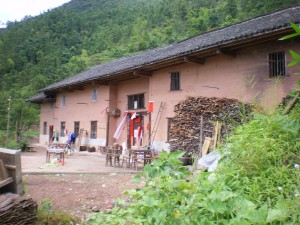Permaculture Design Course “Seeking ancient knowledge in rural China”
A bit of history
 Some of the most pristine landscapes lay in the beautiful Hunan province of China. These landscapes are tidily linked with their people. The autonomous communities of the Yaos have lived in harmony with nature for hundreds of years. They have developed an understanding of their environment and refined their technologies which allowed them to thrive as healthy human beings.
Some of the most pristine landscapes lay in the beautiful Hunan province of China. These landscapes are tidily linked with their people. The autonomous communities of the Yaos have lived in harmony with nature for hundreds of years. They have developed an understanding of their environment and refined their technologies which allowed them to thrive as healthy human beings.
Healthy rice paddies and forest systems provide them with food, clothes, musical instruments and medicine; the clay soils helped them to build rammed earth mansions. Observation and fine tuning applied to their systems have allowed them to master the flow and potential energy of water, develop permanent fertility cycling systems using gravity or livestock and create the tools required for assuring food securit
y (natural preservation techniques).
 Our latest civilization’s evolution has brought new excitement and promises to the contemporary generations. A chance to go to the cities and study, has brought new dreams into their culture, kids have integrated them and dived into the new world until now so far away (for a very long time there was very little communication outside of their valley).
Our latest civilization’s evolution has brought new excitement and promises to the contemporary generations. A chance to go to the cities and study, has brought new dreams into their culture, kids have integrated them and dived into the new world until now so far away (for a very long time there was very little communication outside of their valley). What comes next is not so different to the rest of the world, cities expand, competition and pollution increase, quality of life degrades while the older generation is missing a link to pursue the continuity and the sobriety of their lifestyle. Traditionally elders are being taken care of by their children, thus they end up leaving their village to join the cities, abandon their houses, their gardens, their traditions, moving away from a productive lifestyle to a consumerist one.
What comes next is not so different to the rest of the world, cities expand, competition and pollution increase, quality of life degrades while the older generation is missing a link to pursue the continuity and the sobriety of their lifestyle. Traditionally elders are being taken care of by their children, thus they end up leaving their village to join the cities, abandon their houses, their gardens, their traditions, moving away from a productive lifestyle to a consumerist one.
Chenli is one of those chilren who had the opportunity to study in the city. She met Pascal in Xiangtan while he was working there. They got married and decided to come back to France and start their family in the French countryside. Chenli’s brother and sister have also left the countryside and in the last few years her parents have also moved to the city, leaving their house to itself, abandoning their gardens, their valley…
Pascal has been a permaculture teacher and designer since 2009. He started ‘Brin de Paille’, the french permaculture network which is helping to connect thousands of people throughout France and French speaking countries. He is also a diploma tutor for the ‘People’s Permaculture University’, he helped to adapt the permaculture diploma pathway in France and has accompanied many students in their research and design work.
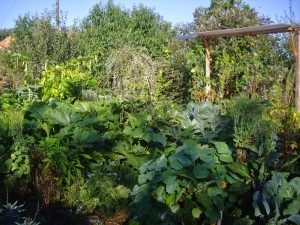 Pascal and Chenli, along with Tino and Kimi, their sons, live in their confortable hand made strawbale house south of Poitiers, France, applying permaculture principles in their lives, reaching near self sufficiency in vegetables, energy, water and fertility. They regularly host courses and internships sharing their knowledge, visions and joy with many through their non-profit organization terre-paille et compagnie .
Pascal and Chenli, along with Tino and Kimi, their sons, live in their confortable hand made strawbale house south of Poitiers, France, applying permaculture principles in their lives, reaching near self sufficiency in vegetables, energy, water and fertility. They regularly host courses and internships sharing their knowledge, visions and joy with many through their non-profit organization terre-paille et compagnie .
Some of our goals in permaculture are so tidily linked with the traditionnal knowledge and lifestyle of the Yaos that we cannot just sit here and watch this happening: an essential cultural heritage disappear in just one generation.
With the Pumendadi project, Pascal, Chenli, Geoffroy and Sam (see description below) wish to give this land and its inhabitants a chance to pass on their culture and heritage to the new generation. They decided to dedicate their skills, energy and time to gather funds and all kinds of help to fulfil that goal and participate in the revival of the valley.
Goals
– To set up a heritage of knowledge collection /permaculture center.
– To start a program of traditional knowledge collection.
– To study, experiment and record farming techniques, self-sufficiency technologies, share a lifestyle and develop trades to function with the modern world.
– To revitalize the valley with active social presence, creating and implementing uplifting solutions for on site beings
– To bring some useful modern conveniences (windows, insulation, efficient heating systems, diversity of crops and skills),
What we offer
– A certified Permaculture Design Course ( September 20th – October 4th)
– A “Permacamp” (month long hands-on applied permaculture, the main focus will be to renovate and upgrade Chenli’s parents house) (October 4th to October 25th)
-Have a least three students to prepare the diploma of applied permaculture. Three free internship positions will be opened for those who are ready to stay and care for the land and the house throughout the year. After two years of experimentation and documentation followed by their tutor, they should be ready to get the diploma
– Free course for: – translator willing to join the team of translators (english-chinese)
– cameraman and skilled editor
Certified Permaculture Design Course(PDC)
From 20th september to 4th october
The course, certified by the French university of Permaculture, will consist of a broad range of topics applicable to life anywhere on this planet, yet will be tailored to the needs of the students present as well as the location at hand. As part of the course, participants will help to co-create designs for real world projects that could include elements such as food forests, permaculture-style gardens, natural building, water catchment and irrigation systems. All will have an opportunity to take part in the existing permaculture activities on the hosting land.
Every day will be composed of three sessions of 1,5 hours of theory and a 2 hour practice.
In this course, we will cover every major topic in Bill Mollison’s: Permaculture: a Designer’s Manual. What that includes is the following:
1. Philosophies and Ethics underlying permaculture
2. Basic permaculture principles
3. Patterns in Nature and how to use that in permaculture design
4. Methods of design. How to apply permaculture design tools and strategies to your design problems. How to increase your chance of a successful design by following a well defined design methodology.
5. Climactic factors and strategies. We will cover all the major climates and how to work with them.
6. Trees, forests and Forest gardening. How to mimic natural forest systems to create an abundance of food, fiber and fodder.
7. Water: catchment, usage, importance, and conservation.
8. Soil structure, minerals, microorganisms, building new soil and preventing erosion. Learn to work with the soil food web to create a healthy ecosystem and regenerate degraded land.
9. Earthworks. How to shape the land to help it achieve the goals we are aiming for.
10. Natural Building. How to build structures with materials available on-site.
11. Alternative systems. Community living and other ways of living differently that work well for people and the planet. Bioregional organization, community development, alternative economic systems, permaculture as aid.
Each of these categories has subcategories and each teacher also has their own additions and certain topics that are stressed over others.
The teachers
Pascal Depienne
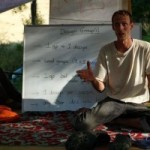 Pascal has taught around 40 PDCs in France and Europe, in both English and French. He has also designed more than 20 pieces of land for professionals and Individuals, his website is http://avenirpermaculture.fr. He has created the French association of permaculture and co-created the French university of Permaculture, he now lives in France with his wife on their non-profit project: http://terre-paille.fr. He is now working on two main projects: a nursery of permaculture trees (and other useful plants) and the conservation of Kazakhstan apple trees (http://hommespommes.fr).
Pascal has taught around 40 PDCs in France and Europe, in both English and French. He has also designed more than 20 pieces of land for professionals and Individuals, his website is http://avenirpermaculture.fr. He has created the French association of permaculture and co-created the French university of Permaculture, he now lives in France with his wife on their non-profit project: http://terre-paille.fr. He is now working on two main projects: a nursery of permaculture trees (and other useful plants) and the conservation of Kazakhstan apple trees (http://hommespommes.fr).
Sam Trousdale
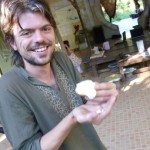 Sam has been learning, practising and teaching permaculture for the past six years. He has worked on and taught at projects in England, France, Romania, Thailand, India and China. He was one of the managers of The Panya Project, a permaculture education centre in northern Thaïland, where he was in charge of the animals and forest garden, until just recently when he decided to move back to China. Sam has lived in China, on and off, since 2003 and is now based in Yunnan where he is looking for land to start a project of his own and work on his diploma in applied permaculture design. He is currently helping to build a school for city kids to go and learn about nature and self reliance.
Sam has been learning, practising and teaching permaculture for the past six years. He has worked on and taught at projects in England, France, Romania, Thailand, India and China. He was one of the managers of The Panya Project, a permaculture education centre in northern Thaïland, where he was in charge of the animals and forest garden, until just recently when he decided to move back to China. Sam has lived in China, on and off, since 2003 and is now based in Yunnan where he is looking for land to start a project of his own and work on his diploma in applied permaculture design. He is currently helping to build a school for city kids to go and learn about nature and self reliance.
Geoffroy Godeau
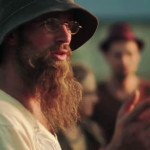 Geoffroy is a friend and collegue of the Depienne familly, and part of the Surplus Design staff, he is also the link between the two projects. Geoffroy is from Belgium where he graduated in landscape architecture.He discovered permaculture in Nicaragua, while travelling the world. He has been living on and off at the Panya Project for the last 8 years, learning and teaching mainly about natural building. He has been working and teaching on natural building projects in Belgium, France and the USA. He is passionate in the investigation and practice of permaculture techniques in landscaping projects. He is also part of “brin de paille” the French speaking permaculture network in Europe and a partner on the conservation of Kazakhstan apple trees (http://hommespommes.fr).
Geoffroy is a friend and collegue of the Depienne familly, and part of the Surplus Design staff, he is also the link between the two projects. Geoffroy is from Belgium where he graduated in landscape architecture.He discovered permaculture in Nicaragua, while travelling the world. He has been living on and off at the Panya Project for the last 8 years, learning and teaching mainly about natural building. He has been working and teaching on natural building projects in Belgium, France and the USA. He is passionate in the investigation and practice of permaculture techniques in landscaping projects. He is also part of “brin de paille” the French speaking permaculture network in Europe and a partner on the conservation of Kazakhstan apple trees (http://hommespommes.fr).
Facilities & Accommodation
– in the house, dormitory
– camping
– traditional toilets and solar showers
– bring your sleeping bag, a camping lamp, clothes for playing with dirt, notebooks, pen, colour markers.
Arrival and Departure
Meeting point for the Permaculture Design Course
arrive at any cost at least two days before in Jianghua (18th of september). We will come and pick you up in Jianghua train station at 12 noon on the 19th.
We will communicate a phone number through email after you contact us.
Meeting point for the Permacamp
arrive at any cost at least two days before in Jianghua (2nd of october). We will come and pick you up in Jianghua train station at 12 noon on the 3rd of october..
We will communicate a phone number through email after you contact us.
Registration and Deposit
Full price: 4500 yuan (675€) (725$)
Deposit for registration: 1500 yuan (225€) (240$)
For the deposit, go to this page:
 surpluspermaculturedesign
surpluspermaculturedesign